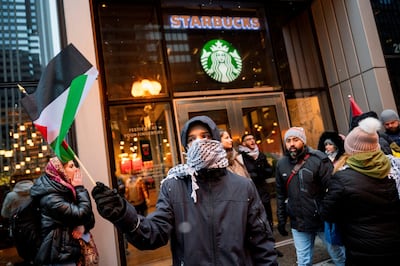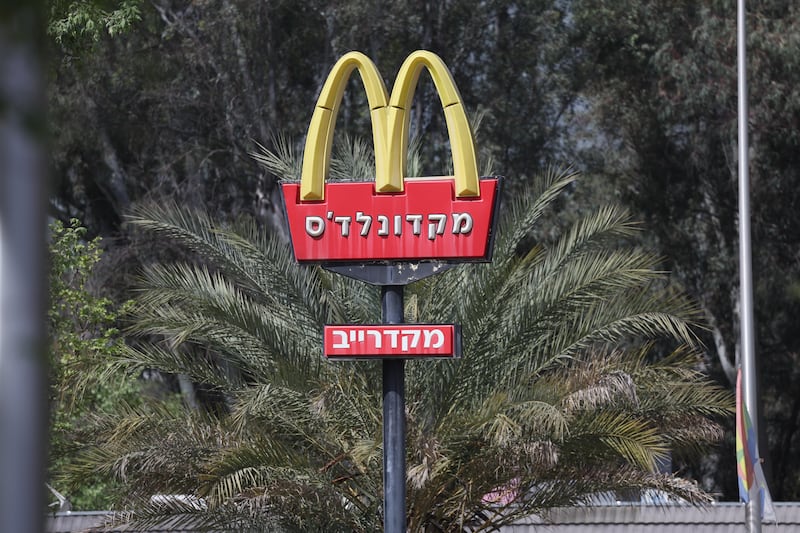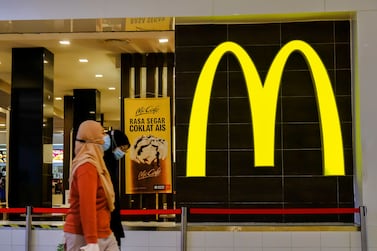Live updates: Follow the latest on Israel-Gaza
McDonald's has announced it will buy back its Israeli franchise Alonyal Limited, reclaiming its 225 restaurants in Israel after the franchise became a flashpoint at the start of the war in Gaza.
The company said the franchise's 5,000 employees will keep their jobs.
“For more than 30 years, Alonyal Limited has been proud to bring the Golden Arches to Israel and serve our communities,” said Omri Padan, Alonyal's chief executive and owner.
The fast food chain has faced protests and boycott calls after Alonyal claimed to have provided free meals to the Israeli military shortly after the October 7 attack by Hamas on southern Israel.
McDonald's Corporation said the Israeli franchise had acted without headquarters' approval.
McDonald's at the time rejected what it called “inaccurate reports” over its stance on Gaza. The company and its Middle East operators – including in the UAE, Saudi Arabia, Bahrain and Kuwait – said it was not supporting any governments in the conflict.
In a statement released on Thursday, McDonald's said it “remains committed to the Israeli market and to ensuring a positive employee and customer experience in the market going forward”.
“We thank Alonyal Limited for building the McDonald’s business and brand in Israel over the past 30 years,” said Jo Sempels, president of international developmental licensed markets at McDonald’s Corporation.
The conflict in the Middle East contributed to the US burger company missing its sales expectations in the fourth quarter last year.
But with more than 40,000 restaurants worldwide, the fate of the 225 locations in Israel “will likely not be a needle mover to the bottom line”, said Art Hogan, B Riley Wealth's chief market strategist.
“The company made the decision to try to remove the appearance politics out of their fast-food restaurants. The McDonald’s Corporation has been clear that it has never taken a position in this or any conflicts in the Middle East,” Mr Hogan told The National.
“As a template for other multinational franchise companies, McDonalds has just set the bar for appropriate behaviour.”
McDonald's said it had “nothing more to share beyond what’s been included in the press release” when asked if the agreement was because of sales in the region, or because of concerns that Alonyal was being too political.
Other US-based companies have faced similar protests and calls for boycotts over the war.
Coffee chain Starbucks, which has bumped down its annual sales forecast, has blamed “misrepresentation on social media” for the protests at its outlets.
The Seattle-based company was drawn into the debate over the Israel-Gaza war after one of its unions' social media posts expressing “solidarity” with Palestine was taken down.

Drinks giant Coca-Cola and pizza chain Dominos have also experienced protests and calls for boycotts.
In February, McDonald's chief executive Chris Kempczinski said the conflict was having a “meaningful” impact on some markets in the Middle East, as well as in Malaysia and Indonesia.
“Our outlook is, so long as this conflict, this war, is going on … we’re not expecting to see any significant improvement in this,” he said in a conference call.
McDonald's said the sale is subject to certain conditions and is expected to close in the coming months. It did not disclose the terms of the deal.
More than 33,000 people have been killed in Gaza since war broke out, according to local health authorities.
The UN food agency has warned that famine is imminent in northern Gaza. The same report found that half the Gaza population is experiencing “catastrophic food insecurity”.







